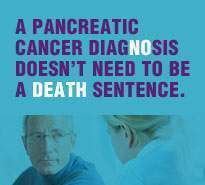Deliver Your Diagnosis or Treatment with a Prescription for Hope.
 There are choices for pancreatic cancer patients. The choices begin with knowledge. Tell your patients to contact the PanCAN Patient Services at the Pancreatic Cancer Action Network. Patients will find hope here.
There are choices for pancreatic cancer patients. The choices begin with knowledge. Tell your patients to contact the PanCAN Patient Services at the Pancreatic Cancer Action Network. Patients will find hope here.
Dedicated PanCAN Patient Services Case Managers are available by phone or email to provide a variety of resources including:
- Personalized and simplified clinical trials searches using our database – the most comprehensive and accurate in the United States. We recommend that all patients consider clinical trials each time a new treatment approach is discussed.
- Information about diagnosis and treatment options.
- Connections with survivors and caregivers for support and encouragement.
- Excellent education materials can be sent to both patients and physicians. Order here.
All PanCAN Patient Services are free of charge.
Contact PanCAN Patient Services, Monday – Friday, 7 a.m. to 5 p.m., PT. 877-272-6226
Pancreatic Cancer Action Network report finds that pancreatic cancer could become the second leading cause of cancer death in the U.S. by 2020
Due to a lack of early detection tools and limited treatment options, pancreatic cancer is the fourth leading cause of cancer death in the U.S. Even more alarmingly, according to a recent report released by the Pancreatic Cancer Action Network, trends in incidence and death rates suggest that pancreatic cancer is poised to move from the fourth to the second leading cause of cancer death by 2020, and possibly as early as 2015. Read more…
Pancreatic Cancer Action Network is Hopeful Asset for Your Patients
Delivering a diagnosis of pancreatic cancer to a patient is never easy. The five-year survival rate hovers at the six percent mark, and 75 percent of patients lose their fight in the year. Many doctors feel that telling a patient they have cancer of the pancreas is often like delivering a death sentence. It is contrary to the best part of the medical delivery system – making patients well. Gastroenterology specialists often give this bad news, and it is uncomfortable. Read more…





